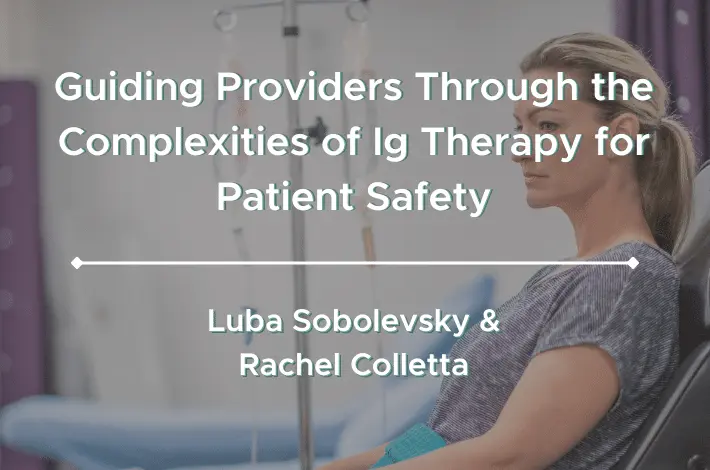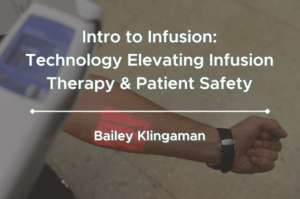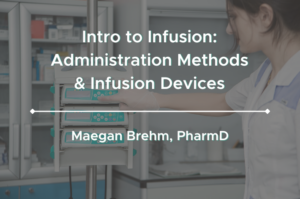IgNS President/CEO Luba Sobolevsky and Director of Educational Resources Rachel Colletta explore the factors that make immunoglobulin therapy so complex, and the different solutions and resources clinicians can use to ensure safe and effective treatment.
The Immunoglobulin National Society (IgNS) emerged in 2012 as the leading multidisciplinary association for healthcare professionals (HCPs) involved in the practice of immunoglobulin (Ig) therapy. From the beginning, IgNS dedicated itself to supporting clinicians with education and critical resources to advance and sustain this highly complex practice, as well as championing the needs of patients with immune and autoimmune disorders who depend on this lifelong therapy.
IgNS: A Multidisciplinary Leader in Healthcare
IgNS is a diverse, professional organization representing a wide range of HCPs, including nurses, pharmacists, and physicians. It encompasses various practice settings, such as specialty infusion, ambulatory infusion centers, private practices, hospitals, and home health. This diverse representation underscores IgNS’ commitment to providing holistic, patient-centered resources and solutions to address the unique challenges of Ig therapy.
Navigating Immunoglobulin Therapy Complexities
Ig therapy is a highly specialized field that presents clinicians with a myriad of challenges:
Complexity of Ig Therapy
Ig therapy involves the administration of immunoglobulin to patients with various immune deficiencies and autoimmune disorders. Healthcare professionals must have a deep understanding of the diagnostic differences, available Ig products, safety and efficacy, dosing, routes of administration, and individualized treatment protocols.
A Spectrum of Diseases
Ig therapy has been shown to be used in over 70 different clinical indications. Clinicians must be well-versed in understanding the diagnoses, from primary and secondary immunodeficiencies to autoimmune neuromuscular, inflammatory, rheumatologic, hematologic, and other disorders.
Patient Variability
Patients receiving Ig therapy can vary significantly in terms of their diagnoses, disease severity, comorbidities, risk factors, tolerability, and response to treatment. Healthcare professionals must adapt their care plans to address each patient’s unique needs to ensure safety and good clinical outcomes. Individualized care is critical yet challenging in the ambulatory infusion center setting, where nurse-to-patient ratios are not always 1:1.
Customized Care
No two immunoglobulin patients are alike. No two immunoglobulin infusions are alike, regardless of duration of treatment. Healthcare professionals must assess individual patients, considering current health status, age, comorbidities, and drug interactions prior to and during each infusion. This level of customization demands a deep understanding of both Ig therapy and the patient’s diagnosis and assessment findings.
Infusion-Related Reactions
Ig therapy can result in infusion-related adverse reactions. The incidence and severity of such reactions can vary based on patients’ individual tolerability of the product brand, route, infusion rate, hydration status, risk factors, and more.¹ Healthcare professionals must have expertise in mitigating and preventing adverse events to ensure patient safety. IgNS educational programs and comprehensive resources equip clinicians and organizations with the knowledge and skills to handle these situations effectively.
Patient Education
Educating patients about their Ig therapy options, including the benefits, route of administration, potential adverse reactions, communication with their healthcare team, documentation, and more, is crucial for successful treatment. Healthcare professionals need effective communication skills and strategies to empower patients to take an active role in their care.
Empowering Patients
An educated and well-informed patient is an engaged patient. Clinicians who can effectively educate their patients foster a sense of partnership in care, leading to better outcomes and patient satisfaction. IgNS’ patient-focused programs enhance the infusion experience and promote empowerment.
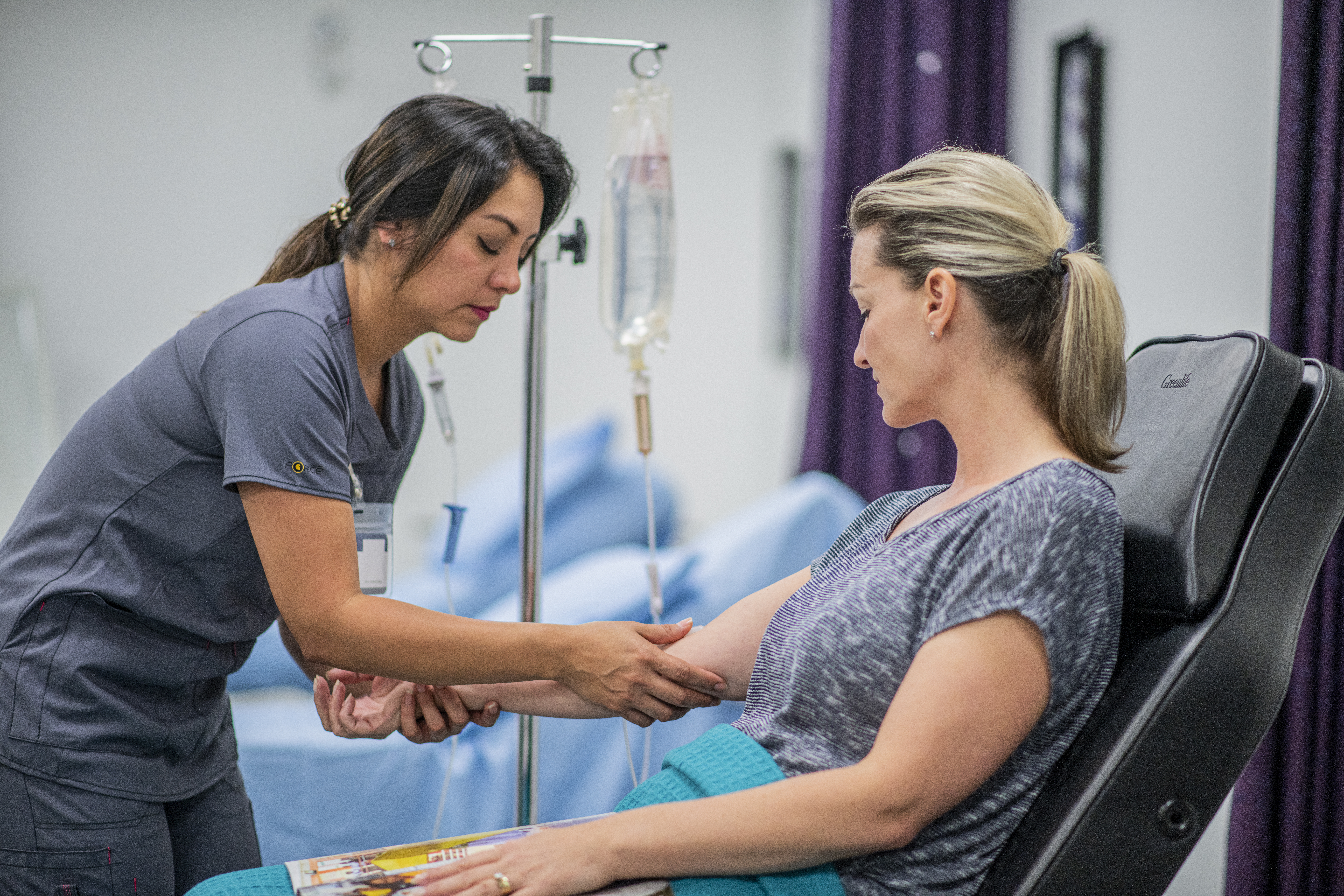
Solutions for the Ig Clinician
Standards of Practice
Ig therapy is complex, and ensuring safe and effective treatment is paramount. Adhering to standards of care across clinical disciplines improves compliance and facilitates consistent, highest-quality patient care at every infusion. The IgNS Standards of Practice are comprehensive, legally defensible, and empower clinicians to:
Navigate Clinical Complexities
Ig therapy spans a wide spectrum of disease states, from primary immunodeficiencies to autoimmune disorders. Healthcare providers can face the challenge of managing patients with diverse medical conditions, each requiring a tailored approach to Ig therapy. IgNS standards help streamline practices, ensuring patients receive the proper treatment at the right time.
Ensure Safety and Efficacy
Patient safety is the top priority. Clinicians rely on IgNS guidelines to ensure safe and effective practice, from identifying risk factors to monitoring and reducing infusion reactions to individualizing infusion protocols and beyond.
Education and Training
The complexities of Ig therapy demand continuous advancement through education and skill development. IgNS offers comprehensive continuing education (CE)/continuing medical education (CME) programs, webinars, and live sessions to educate and empower healthcare providers. These resources equip HCPs with the knowledge needed to navigate the intricacies of Ig therapy confidently.
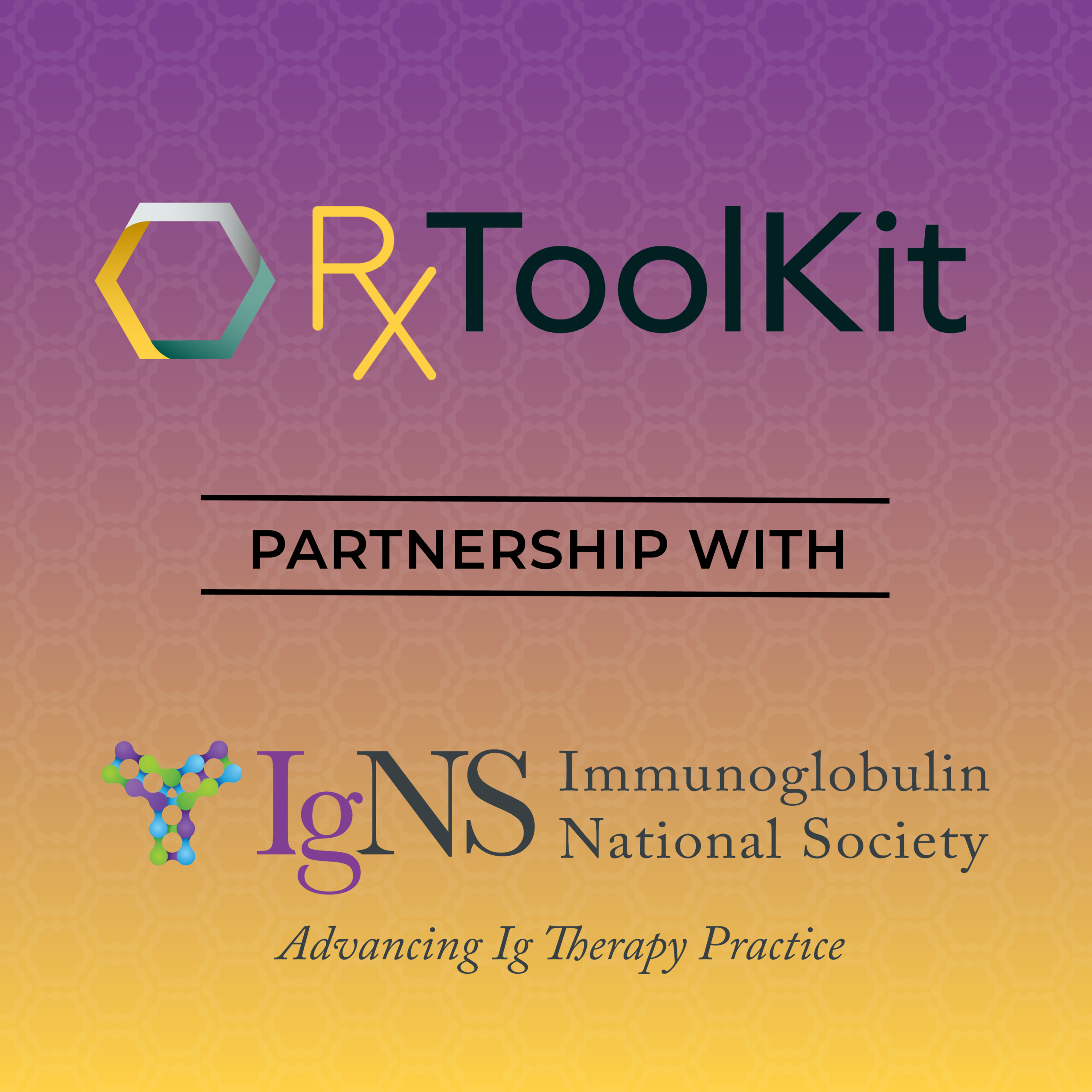
As of October 2023, IgNS has partnered with RxToolKit to provide up to 25 IgNS clinical CE/CME courses to be offered on RxELearning, RxToolKit’s clinical training and education platform. This collaboration enables RxToolKit members to access IgNS’ comprehensive educational courses, enhancing their knowledge and expertise and improving patient safety.
Mastering Ig Therapy Principles
Ig therapy practice requires a deep understanding of the different Ig products, dosing regimens, and infusion protocols. Clinicians rely on IgNS’ comprehensive educational programs to master these principles and provide patients with the highest quality care.
Staying Current
Medical science is constantly evolving, and so is the field of Ig therapy. Clinicians must stay up to date with the latest research and treatment guidelines. IgNS educational programs and practice resources provide a comprehensive platform for practice advancement to ensure the best patient outcomes.
Certification
Specialized certifications in Ig therapy – the Immunoglobulin Certified Nurse (IgCN®) and Immunoglobulin Certified Pharmacist (IgCP®) – document and validate the expertise of nurses and pharmacists and set them apart as leaders in the field. Obtaining and maintaining these prestigious credentials demonstrates a commitment to excellence in Ig therapy. Achieving the IgCN® and/or IgCP® credentials:
Validates Clinical Excellence
The IgCN®/IgCP® credentialing programs document the knowledge and expertise of clinicians in Ig therapy. For patients and employers, the certifications assure high-quality care and competence in accordance with the established practice standards.
Advances Ig Therapy Practice
By achieving the rigorous standards set by the certification, clinicians demonstrate clinical competence and confidence in this complex field, protecting their practice, organizations, and, most importantly, their patients.
Resources
IgNS equips professionals with essential tools, including standards of practice, guides, policy templates, and certification preparation. These resources are invaluable in helping healthcare providers navigate the intricacies of Ig therapy and ensure optimal patient care.
Policy Development
Establishing effective policies and procedures is a cornerstone of safe and efficient healthcare practice. IgNS resources provide a foundation for organizations to develop their own policies aligned with the national standards.
Certification Support
Professionals preparing for the IgCN® and/or IgCP® credentialing examinations have access to comprehensive study materials to help them succeed. These resources are a critical asset in the journey toward certification.
Membership
IgNS members enjoy full access to a suite of resources, standards, education, exclusive programs, discounted rates on conferences and certification, and more. Individual and group (corporate) memberships set clinicians and organizations apart and demonstrate commitment to best clinical practice and patient care.
Join IgNS today and take your practice to the next level!
Conclusion
IgNS is the central, standards-setting organization in the highly complex, fast-evolving field of immunoglobulin therapy. Its multidisciplinary approach, commitment to the standards, and dedication to education and certification make it an indispensable resource for clinicians practicing in this field.
Are you ready to expand your education and skills, engage with top clinical leaders, advance your expertise, and protect your patients? Join IgNS today and become a part of an empowered community of clinical leaders committed to the best patient outcomes.
¹Guo Y, Tian X, Wang X, Xiao Z. Adverse Effects of Immunoglobulin Therapy. Front Immunol. 2018 Jun 8;9:1299. doi: 10.3389/fimmu.2018.01299. PMID: 29951056; PMCID: PMC6008653.
Luba Sobolevsky, PharmD, IgCP® is the President/CEO of the Immunoglobulin National Society (IgNS), the central healthcare organization in the field of Ig therapy. Luba oversees all areas of IgNS, including education, standards of practice, certification, professional resources, development, advocacy, and alliances. Luba holds a BA from UCLA and a Doctor of Pharmacy degree from the University of Southern California. Her expertise spans various fields in healthcare, including clinical, educational development, and pharmaceutical industry.


